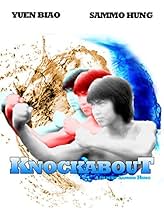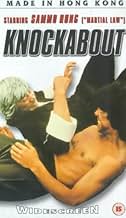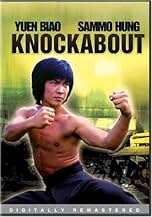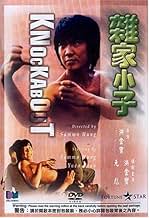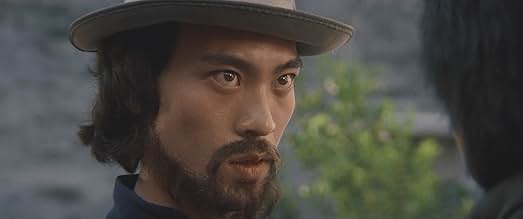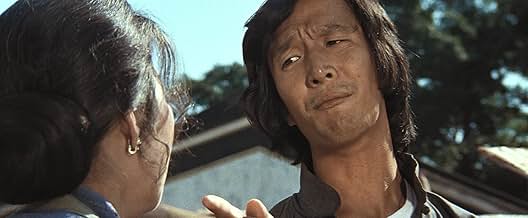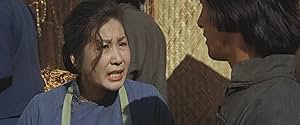IMDb-BEWERTUNG
7,2/10
1661
IHRE BEWERTUNG
Füge eine Handlung in deiner Sprache hinzuTwo brothers and small time crooks Yipao and Taipao convince a martial arts expert to take them on as students, completely oblivious to his sordid past.Two brothers and small time crooks Yipao and Taipao convince a martial arts expert to take them on as students, completely oblivious to his sordid past.Two brothers and small time crooks Yipao and Taipao convince a martial arts expert to take them on as students, completely oblivious to his sordid past.
- Regie
- Drehbuch
- Hauptbesetzung
Ka-Yan Leung
- Dai Pao
- (as Chia-Jen Liang)
Liu Chia-Yung
- Koo Wu-Tai
- (as Kar-Wing Lau)
- …
Kuang Yu Wang
- Matchmaker
- (as Kuan-Yu Wang)
Karl Maka
- Police Captain
- (as Kar Mak)
Tin-Chi Lau
- Banker Wei's Father
- (as Tin-Chee Lau)
Empfohlene Bewertungen
Knockabout is Yuen Biao's debut as leading man. Directed by his good friend Sammo, who also put together the fights as well. Overall, this was well done. However, the goofy humor wore a little thin on me this time around. Perhaps I am a little burned out by watching 4 of these kung fu /comedies in a row. I won't complain about the fights, they are fast and furious and as good as they can be. For acrobatic kung fu, Yuen Biao's in the A list. Compared to his other two Chinese opera brothers (Jackie and Sammo), Yuen Biao is sometimes overlooked. This has a good cast with Yuen, Sammo, Beardie and other familiar faces from 70's/80's kung fu films. Knockabout does not rank as one of favorites, but it's a good enough watch to recommend to fans of the genre.
10scottnow
I just love this movie and give it 10 out of 10. Sammo is great and is his usual funny self with great martial arts, but Yuen Baio is AMAZING! I know he is famous for his kicking and acrobatic prowess, but in this film he is absolutely awesome. Some of the training sequences with Sammo where he is back flipping, somersaulting etc whilst using a skipping rope really show his fantastic acrobatic skills and he looks dead cute and sexy as well. His facial expressions are great whether he is being silly or serious and shows that he also a good actor as well as being an amazing martial artist. If you are a Yuen Baio fan, this film is a DEFINITE MUST SEE.
10illogik
Its no joke, this movie is INSANE.
Hong Kongs most underated talent Yuen Biao and Hong Kongs greatest talent and my personal favorite Sammo Hung team up for some memorable scenes. The training montage is the best i have ever laid eyes on Yuen does back flips, kip ups, cartwheels, sommersaults and a plethora of other superhuman feats.... WHILE SKIPPING! Another act that had my jaw on the floor was Yuen Biao doing strait legged backwards tumbles with sharpend bamboo splints strapped to the back of his legs. Must be seen to be belived.
10/10 An often overlooked classic.
Hong Kongs most underated talent Yuen Biao and Hong Kongs greatest talent and my personal favorite Sammo Hung team up for some memorable scenes. The training montage is the best i have ever laid eyes on Yuen does back flips, kip ups, cartwheels, sommersaults and a plethora of other superhuman feats.... WHILE SKIPPING! Another act that had my jaw on the floor was Yuen Biao doing strait legged backwards tumbles with sharpend bamboo splints strapped to the back of his legs. Must be seen to be belived.
10/10 An often overlooked classic.
First things first: the fight scenes in "Knockabout" are plentiful and SUPERB. Some of them are staged like elaborate comic dances - Charlie Chaplin and Buster Keaton would probably be pleased if they could see some of the gags here. In addition to his great fighting, Yuen Biao performs many admirable acrobatic feats (I doubt that Jackie Chan could ever do some of the stuff that Biao does here), and Sammo Hung moves with incredible agility for a man his size! There is also a lot of comedy in this film, which will not be to everyone's taste, as it involves a lot of mugging and twitching (as well as exaggerated sound effects and animal sounds), but there ARE some genuinely funny moments. The only problem with the film is the plodding pacing: there simply isn't enough story to support 100 minutes of running time. (**1/2)
Yuen Biao never got the acclaim that his Peking Opera brothers Sammo Hung and Jackie Chan obtained (all part of the Seven Little Fortunes), but for martial art movie fans he is still widely appreciated. His breakout in the Hong Kong film industry was his first starring role in Knockabout in 1979. Of course, it helped that the director was Sammo Hung Kam-Bo, but Yuen's reputation was solid for his years of stunt work, being an extra and doubling actors for dangerous or acrobatic scenes (he would continue to do that after this film). This film is full of under-appreciated martial artists and performers though.
Knockabout is the fourth film directed by Sammo Hung and is one of the many hybrid Kung Fu comedies (Mo Lai Tau style) produced by Golden Harvest that were popular in the late 70's Hong Kong like Drunken Master (1978) and Hung's earlier film Enter the Fat Dragon (1978). While it was not the resounding success that Drunken Master was, it has had a resurgence in popularity the past few years.
Biao stars as Hei Yu (also called Little John in the subtitles) as a congenial con-artist with his brother Big John (Leung Kar-Yan: Warriors Two, The Postman Strikes Back) who have to cheat or steal to stay fed. After a successful scam on a cheating gold exchange cashier (working off the old adage that the best people to con are the ones who think they are conning you), they decide to gamble their profit at the local casino. They are quite unsuccessful at it and get beat up when unbeknownst to them they try to fool a gambling house with fake money. But like the consummate con-men they are, if they fail once, they will look for another mark. The new rube is an elderly man (the not-so-elderly and underrated Lau Kar-Wing who is mostly known for being the brother of Lau Kar-Leung, though he is an excellent martial artist who has appeared in many supporting roles) who is eating at the local teahouse. Their set-up fails miserably and so they set to take revenge on Jia Wu-Dao by ambushing him. Of course, he just happens to be a Kung Fu master. After they get beat up they ask him to be their sifu. He eventually acquiesces, but there seems to be something mysterious and sinister about him.
There are a few problems with the film. Karl Maka's role as the bald inspector reminds me too much of a clone of Dean Shek. The composition of the film is unbalanced. It starts mostly with comedy for the first 50 minutes and then ends heavily with action. I liked both elements, but the cohesion of the two did not quite work as a whole. The plot's biggest weakness is the inevitable turn of Jia Wu-Dao against his pupils. You knew it was going to happen, but it felt forced. And the prolific use of lifting copyrighted material for music continues with the cue for the Fat Beggar lifted from Ennio Morricone's score in The Good, The Bad and The Ugly (1966).
Luckily, there is so much to like with this movie. Biao and Leung work well together as brothers and would continue to work with Hung on later films. The portrayal of Jia Wu-Dao by Lau Kar-Wing is interesting because he is not a one-dimensional character. He cares for his adopted pupils and trains them well in martial arts (every good teacher always hides something from his students though). This makes the character change more shocking, but also makes it feel less real. I enjoyed the comedic touches like the overly flexible Yuen Biao (that is not his leg) and the ordinary men they look to beat up.
However, the best parts of the film are the training and martial art sequences in the last half of the movie. These segments are so strong that you tend to forget the somewhat meandering and mostly comedic nature of the previous scenes. The training involves some of the more masochistic devices to help, and I will not spoil them here. I will state that you get to see Biao show off his abilities with his excellent forms and most awesome somersaulting ability. The fighting scenes include an excellent team match between Seven Dwarfs (Lee Hoi-Sang: bald as usual), Snow White (Wang Kuang-Yu: The Water Margin (1972)) versus Little John and Big John. Also, I think you might enjoy the "finishing move" of Jia Wu-Dao. I am not sure I've seen much use of this professional wrestling move in Hong Kong cinema, but I have seen The Rock use it many times. Also, in the tradition of saving the best for last, you get a 12 minute fight sequence at the end that is sublime in its intestinal fortitude.
Sammo Hung was not only the director and a supporting actor in this film; he is also the action director (fans of the auteur theory should take note). His knowledge and presence help make this one of the underrated classics in martial art cinema. The competition between him and Jackie Chan during this time period helped create more intricate and daring martial art scenes for there movies. With Knockabout there is one of the best martial art movie sequences of the 70s. Knockabout is a must watch for devotees of this genre and should be a good case study for future action directors on how to choreograph. Knockabout also shows you the skill of Yuen Biao and why he should be regarded as one of the best martial art actors of the 1970s/80s.
Knockabout is the fourth film directed by Sammo Hung and is one of the many hybrid Kung Fu comedies (Mo Lai Tau style) produced by Golden Harvest that were popular in the late 70's Hong Kong like Drunken Master (1978) and Hung's earlier film Enter the Fat Dragon (1978). While it was not the resounding success that Drunken Master was, it has had a resurgence in popularity the past few years.
Biao stars as Hei Yu (also called Little John in the subtitles) as a congenial con-artist with his brother Big John (Leung Kar-Yan: Warriors Two, The Postman Strikes Back) who have to cheat or steal to stay fed. After a successful scam on a cheating gold exchange cashier (working off the old adage that the best people to con are the ones who think they are conning you), they decide to gamble their profit at the local casino. They are quite unsuccessful at it and get beat up when unbeknownst to them they try to fool a gambling house with fake money. But like the consummate con-men they are, if they fail once, they will look for another mark. The new rube is an elderly man (the not-so-elderly and underrated Lau Kar-Wing who is mostly known for being the brother of Lau Kar-Leung, though he is an excellent martial artist who has appeared in many supporting roles) who is eating at the local teahouse. Their set-up fails miserably and so they set to take revenge on Jia Wu-Dao by ambushing him. Of course, he just happens to be a Kung Fu master. After they get beat up they ask him to be their sifu. He eventually acquiesces, but there seems to be something mysterious and sinister about him.
There are a few problems with the film. Karl Maka's role as the bald inspector reminds me too much of a clone of Dean Shek. The composition of the film is unbalanced. It starts mostly with comedy for the first 50 minutes and then ends heavily with action. I liked both elements, but the cohesion of the two did not quite work as a whole. The plot's biggest weakness is the inevitable turn of Jia Wu-Dao against his pupils. You knew it was going to happen, but it felt forced. And the prolific use of lifting copyrighted material for music continues with the cue for the Fat Beggar lifted from Ennio Morricone's score in The Good, The Bad and The Ugly (1966).
Luckily, there is so much to like with this movie. Biao and Leung work well together as brothers and would continue to work with Hung on later films. The portrayal of Jia Wu-Dao by Lau Kar-Wing is interesting because he is not a one-dimensional character. He cares for his adopted pupils and trains them well in martial arts (every good teacher always hides something from his students though). This makes the character change more shocking, but also makes it feel less real. I enjoyed the comedic touches like the overly flexible Yuen Biao (that is not his leg) and the ordinary men they look to beat up.
However, the best parts of the film are the training and martial art sequences in the last half of the movie. These segments are so strong that you tend to forget the somewhat meandering and mostly comedic nature of the previous scenes. The training involves some of the more masochistic devices to help, and I will not spoil them here. I will state that you get to see Biao show off his abilities with his excellent forms and most awesome somersaulting ability. The fighting scenes include an excellent team match between Seven Dwarfs (Lee Hoi-Sang: bald as usual), Snow White (Wang Kuang-Yu: The Water Margin (1972)) versus Little John and Big John. Also, I think you might enjoy the "finishing move" of Jia Wu-Dao. I am not sure I've seen much use of this professional wrestling move in Hong Kong cinema, but I have seen The Rock use it many times. Also, in the tradition of saving the best for last, you get a 12 minute fight sequence at the end that is sublime in its intestinal fortitude.
Sammo Hung was not only the director and a supporting actor in this film; he is also the action director (fans of the auteur theory should take note). His knowledge and presence help make this one of the underrated classics in martial art cinema. The competition between him and Jackie Chan during this time period helped create more intricate and daring martial art scenes for there movies. With Knockabout there is one of the best martial art movie sequences of the 70s. Knockabout is a must watch for devotees of this genre and should be a good case study for future action directors on how to choreograph. Knockabout also shows you the skill of Yuen Biao and why he should be regarded as one of the best martial art actors of the 1970s/80s.
Wusstest du schon
- WissenswertesThe first lead role for Biao Yuen.
Top-Auswahl
Melde dich zum Bewerten an und greife auf die Watchlist für personalisierte Empfehlungen zu.
- How long is Knockabout?Powered by Alexa
Details
Zu dieser Seite beitragen
Bearbeitung vorschlagen oder fehlenden Inhalt hinzufügen

Oberste Lücke
By what name was Knockabout - Zwei Knochenbrecher rechnen ab (1979) officially released in India in English?
Antwort


